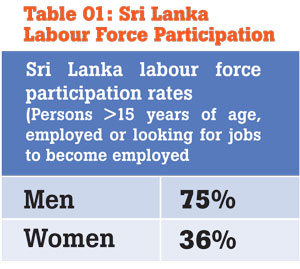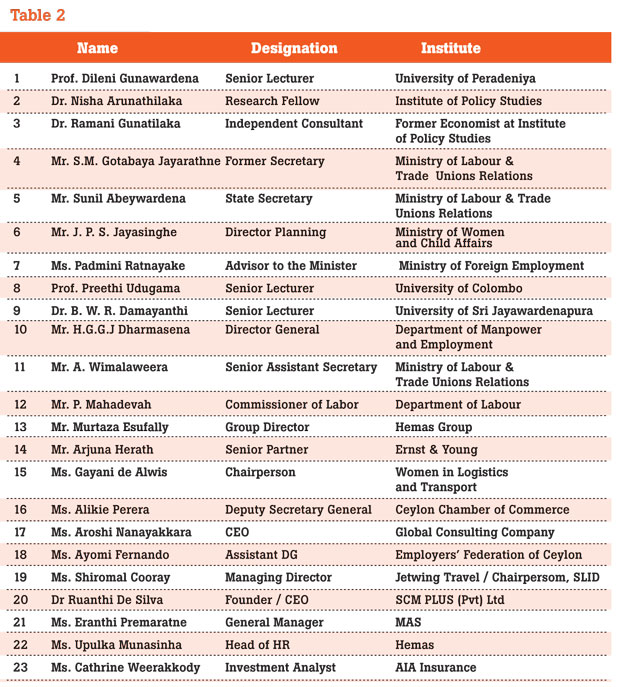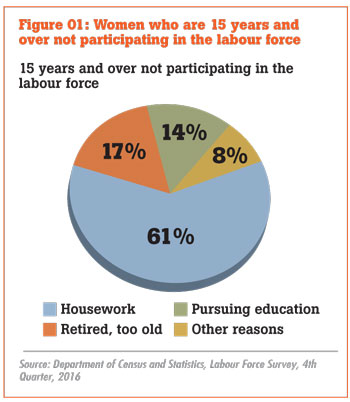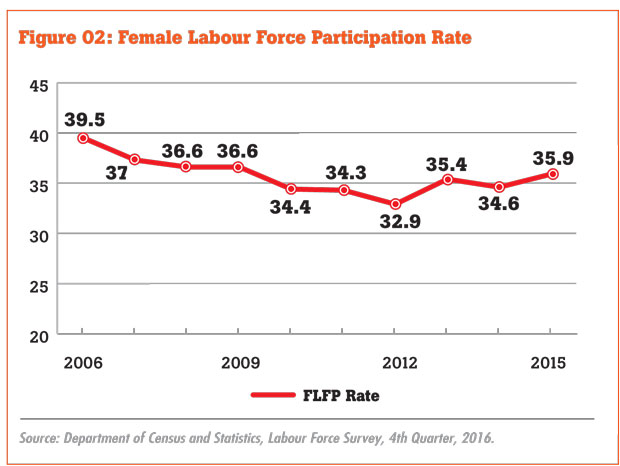25 Sep 2017 - {{hitsCtrl.values.hits}}
The current female labour force participation rate is 36 percent, according to the 2016 fourth quarter of Sri Lanka Labour Force Survey published by the Census and Statistics Department in Sri Lanka.
At present, there are 5,313,997 women who are not in the labour force. The reasons for their lack of motivation to join the labour force have been identified by many studies and policy papers (Gunatilaka 2013, Gunewardena 2015, ILO 2016, Gunatilaka et al. 2017).

The challenge is to motivate at least 5 percent of this number to enter the workforce with a view of creating economic wealth through paid work. There is ample evidence worldwide that when women engage in paid employment, it makes their families, communities and countries wealthier.
Some estimates have put the global loss to gross domestic product (GDP) from women’s non-participation in the economy at the size of the US and Chinese economies (McKinsey Global Institute, 2015).
Evidence points several constraints for women’s participation in the labour force – ranging from archaic legislation to the lack of access to vocational training – it has become increasingly evident that social and cultural factors play a defining role in determining women’s inclusion in the labour market.
A committee under the aegis of the National Human Resources Development Council (NHRDC) identified five areas in which interventions are needed to meet this objective. The committee was headed by Hatton National Bank Chief HR Officer Chiranthi Cooray and included the persons in Table 2.

According to the NHRDC, studies suggest that educated women in Sri Lanka prefer to join the state sector or not join the workforce at all. Nevertheless, the private sector employs the highest number of female employees. In 2015, there were 977,271 female employees in the private sector, which is 35.8 percent of the total employed population of the country (Sri Lanka Labour Force Survey – 2015). Among the reasons that state sector employment appeals to educated women in Sri Lanka are enhanced maternity benefits, short working hours and pension benefits. Among reasons why educated women do not enter the workplace at all, are safety concerns, security, transportation, child and elder care responsibilities, gender-based pay inequities and lack of employable skills
(Gunatilaka, 2013).
A study based on the World Bank’s Skills Toward Employment and Productivity (STEP) method establishes that there is hardly a gender-based skill gap in terms of cognitive skills (Gunewardena, 2015), contrary to
popular thinking.

The study indicates that married women with young children are less likely to be in paid employment and points to the lack of social and systemic recognition of dual income-earning families in our culture and the resultant disincentives to join the labour force.
The committee recommends that the government sets itself the goal of increasing the female labour force participation (FLFP) rate to reach 40 percent by 2020. This is a challenging task, considering the FLFP in this country has been stagnant at mid-30 percent for the last two decades and has declined from 39.5 percent in 2006 to 35.9 percent by 2015.
The task force identified five key areas in which interventions are needed to meet this objective:
National policy and labour law reforms
HR policy interventions public and private sectors
Incentivizing the private sector to hire more females
Social sensitization through public debate via mass media
Education reforms
The interventions outlined in the report recommends that the government, private sector, multilateral agencies and community join hands and partner to achieve the set goals at a national level and thereon at sector and industry levels.

The success of the above outlined initiatives and action plans, according to the report, requires the leadership and competent personnel who appreciates that women’s economic participation or womenomics is an integral part for Sri Lanka’s current and future
economic success. The committee also highlighted the need for positive media messages that reach women on a deeper level. The report was presented to Prime Minister Ranil Wickremesinghe by the National Human Resource Council of
Sri Lanka.
25 Nov 2024 11 minute ago
25 Nov 2024 36 minute ago
25 Nov 2024 1 hours ago
25 Nov 2024 1 hours ago
25 Nov 2024 1 hours ago